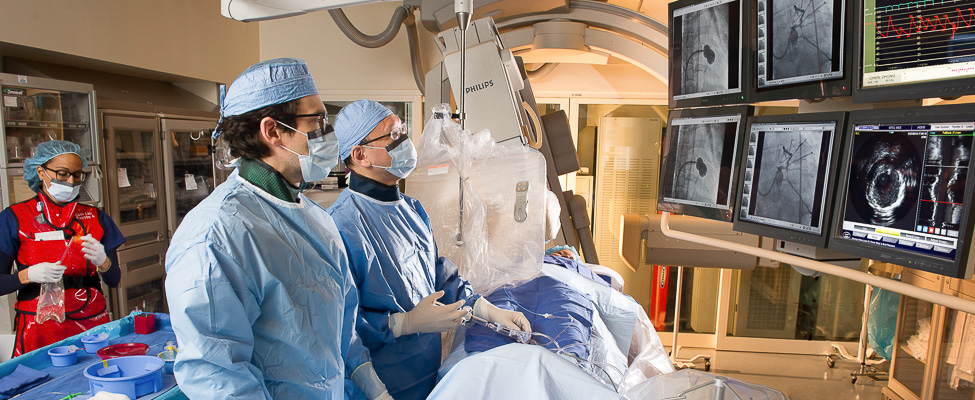Interventional Cardiology Fellowship
Weill Cornell Medical College offers an advanced training fellowship in Interventional Cardiology, accredited by the Accreditation Council for Graduate Medical Education (ACGME). The fellowship consists of one year devoted to intensive training in all aspects of interventional cardiology.
The cardiac catheterization laboratory (“cath lab”) at Weill Cornell is currently made up of five full-time interventional cardiology faculty. The laboratory performs nearly 6,000 total cases and 2,000 percutaneous coronary interventions yearly. Within the division exists a separate heart valve center dedicated to the management of patients with aortic and mitral valve disease.
The cardiac catheterization service maintains a high volume of procedural and clinical practice. The team consists of faculty attendings, a nurse practitioner service, clinical fellows, interventional cardiology fellows, and dedicated nurses, technologists, angioplasty specialists, and research support staff.
Our cath lab faculty considers research to be an integral part of a candidate’s training, and therefore considers past research experience to be an important part of a candidate’s resume.
We recommend that candidates partake in some research endeavor during their general cardiology fellowship. We also recommend that candidates who apply should have had at least 10 months of training within the cath lab during their general cardiology fellowship.
Clinical Experience
Interventional cardiology fellows will be trained in and perform percutaneous coronary interventions using all currently available technologies, including:
- Drug-eluting stents
- Rotational atherectomy
- Thrombectomy devices
- Distal protection devices
- Intravascular ultrasound
- Fractional-flow reserve
The program places a heavy emphasis on a systematic, evidence-based approach to diagnostic and therapeutic coronary and endovascular procedures.
All fellows will have the opportunity to be proficient at the end of training in:
- Diagnostic angiography
- Pericardiocentesis
- Hemodynamic evaluation of patients
- The use of a variety of closure devices, as well as experience in left ventricular assist devices, including the Impella®
Each fellow will also have exposure to peripheral interventions, the treatment of patent foramen ovale and atrial septal defect, alcohol septal ablation, and therapeutic options for the transcatheter treatment of valvular heart disease including TAVR procedures.
The program stresses the development of fellows in all areas of interventional cardiology, as each fellow has ample time to develop expertise in pre-procedural as well as post-procedural management of the patient in both the inpatient and outpatient settings.
Specific rotations within the fellowship include:
- Interventional Cardiology Laboratory with the opportunity to perform many procedures using standard and new technologies. (This forms the core of the fellowship.)
- Outpatient consultation
- Inpatient consultation
Research
The Cath Lab has active clinical research programs, and fellows are expected to participate in projects with the goal of presenting at national meetings and preparing their research for publication in peer-reviewed journals.
Clinical research projects include both prospective (either single-center or multi-center) device and pharmacologic clinical studies and retrospective single-center studies from our own Weill Cornell cardiac catheterization laboratory database or multi-center database from the New York State Angioplasty Registry and the ACC-NCDR Registry. In addition to these areas of research, the laboratory takes part in numerous multicenter clinical trials.
Education
A core curriculum in interventional cardiology is taught throughout the year by the full-time faculty every week.
Periodic conferences include:
- Cardiovascular Grand Rounds (CME)
- Cardiology Clinical Conference (CME)
- CCEP Journal Club
- Bi-weekly Fellows’ Clinical Roundtable
- Cardiac Catheterization Conference
- Cardiology Fellows Journal Club
- Friday Noon Conference
Instructions to Applicants
Fellows must be enrolled in or have completed a fellowship in cardiovascular disease. Fellows are accepted into the program after completing cardiology training.
Applications for July 2026 Weill Cornell Interventional Cardiology Fellowship will begin being accepted after July 2nd, 2025, with a deadline of September 1st, 2025.
Our program is part of the Medical Specialties Matching Program at the National Resident Matching Program (NRMP), which means that on August 27th, 2025, registration begins with NRMP at www.nrmp.org. Click on specialty match (Cardiovascular Diseases) or call (202) 400-2233 or (866) 653-NRMP (6767) for more information.
Application Schedule
- Notifications are sent out in September 2025 to schedule virtual interviews via Zoom.
- October 1st, 2025, is the earliest date to file a rank order list on the NRMP website.
- November 19th, 2025, is the deadline to file rank order list on the NRMP website by 9PM EST
- December 3rd, 2025, the match results are announced at 12PM EST
Use the Electronic Residency Application Service (ERAS) through your Dean's Office and join the National Resident Matching Program (NRMP).
ERAS Program Code: 1543523048
The NRMP Program Code: 1492154S0
Please comply with the following guidelines when completing your application. Only applications with all requested materials will be reviewed.
- Completed ERAS Application
- Letters of Recommendation
- These should be from 2-3 faculty members who have personal knowledge of your professional and personal qualifications. One of these letters should come from your program director or from the service chief under whom you have last served. It is ok to submit more than three letters is ok.) We do not require a Dean's letter.
- Providing USMLE scores is voluntary.
International Applicants
Applicants should have research experience, letters of recommendation from their clinical, and/or research supervisors in the United States and valid ECFMG certification. Though there is no specific board score requirement, a higher score holds greater weight. NewYork-Presbyterian Hospital sponsors J-1 visas only. H1-B visas are not eligible. You will be responsible for retaining an immigration lawyer and for all associated administrative costs. Use the Electronic Residency Application Service (ERAS) through the Educational Commission for Foreign Medical Graduates (ECFMG); and join the National Resident Matching Program (NRMP) for a subspecialty in Cardiovascular Disease. Applicants will be considered for an interview based on their overall record.


